Photographs: Richard Carson/Reuters. Sanjaya Baru
If the United States economy is in dire straits and has been paralysed by a fiscal crisis, what will happen to US power and influence? Economic and geopolitical analysts will recall in days to come the theory of "imperial overstretch" and the economic foundations of the decline of American power put forth over two decades ago by British historian Paul Kennedy (The Rise and Fall of the Great Powers: Economic Change and Military Conflict from 1500 to 2000, Random House, 1987).
Crisis? US will still remain on top
Image: Members of the Westboro Baptist Church of Topeka, Kansas, protest as a call to prayer for a nation.Photographs: Richard Carson/Reuters.
"Strength is of three kinds," wrote Kautilya, "the power of deliberation is intellectual strength; the possession of a prosperous treasury and a strong army is the strength of sovereignty; and martial power is physical strength."
No other nation has understood this inter-connection between the power of knowledge, or "intellectual strength" as Kautilya put it, the prosperity of the treasury and the "strength of sovereignty" better than the United States.
Crisis? US will still remain on top
Image: Protesters line the street outside Reliant stadium.Photographs: Reuters.
The US won the Cold War by investing in its knowledge economy and building one of the most creative and enterprising economies ever known to man.
China learnt this simple lesson well when its post-revolutionary leader Deng Hsiao Peng launched the Four Modernisations and chose to build a strong treasury, a strong intellectual base and a strong army, avoiding the Achilles heel of "military overstretch" that finally resulted in the implosion of the Soviet Union.
Crisis? US will still remain on top
Image: An electronic board on the floor of the New York Stock Exchange.Photographs: Reuters.
Crisis? US will still remain on top
Image: A For Sale sign is seen outside the Central Falls Department of Parks and Recreation.Photographs: Brian Snyder/Reuters.
In failing to arrive at a political consensus on a fiscal strategy that would empower the American "state", the political leadership in the US, cutting across political parties, has put the international community on high alert.
Crisis? US will still remain on top
Image: Goldman Sachs building is seen at 200 West Street, New York.Photographs: Shannon Stapleton/Reuters.
Crisis? US will still remain on top
Image: Developer Azeem Kahn poses outside a home he is building in Chicago.Photographs: John Gress/Reuters.
Crisis? US will still remain on top
Image: An employee counts US dollars next to yuan banknotes at a bank.Photographs: Reuters.
Crisis? US will still remain on top
Image: A trader works on the floor of the New York Stock Exchange.Photographs: Brendan McDermid/Reuters.
Crisis? US will still remain on top
Image: People hold signs as dozens of Tea Party supporters rally near the US Capitol against raising debt.Photographs: Jonathan Ernst/Reuters.
Crisis? US will still remain on top
Image: US President Barack Obama.Photographs: Reuters.
Neither China nor India, nor indeed much of south-east and east Asia, Africa and Latin America, has lost its momentum, even if many (like India) have slowed down.
Differential economic performance is good for global stability and if national governments pursue policies that seek to stabilise growth at home, these should not be frowned upon by the globalisers of the era of finance capitalism.
Crisis? US will still remain on top
Image: Dollar notes.The new geoeconomics of growth will have geopolitical consequences. But never underestimate the ability of a "global" power like the United States to benefit even from a shift of power from the West to the East. After all, the US has declared itself an Asian power!






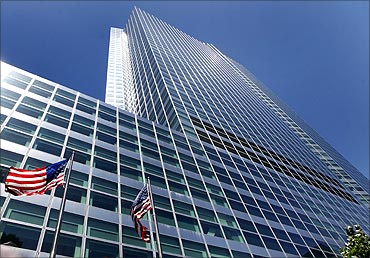

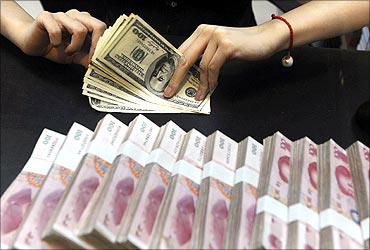
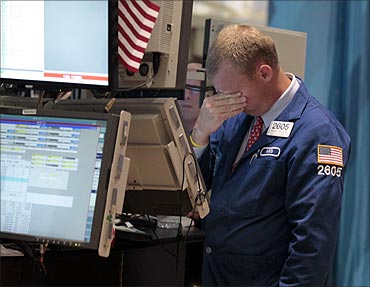

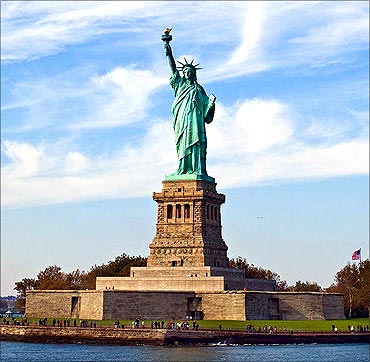
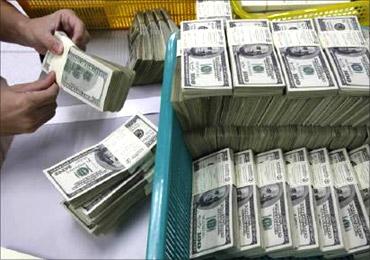

article